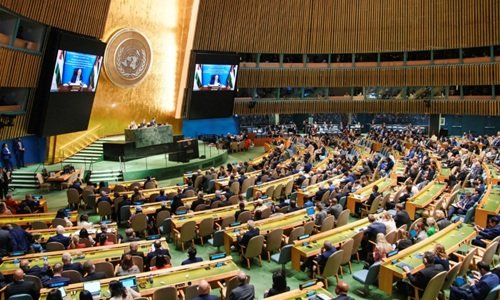Palestinian President Mahmoud Abbas, speaking by video link after being denied a U.S. visa, welcomed the diplomatic momentum.
A growing number of world leaders used the UN stage on Monday to formally recognize Palestinian statehood, marking a significant diplomatic shift nearly two years into the Gaza war and putting them at odds with Israel and its closest ally, the United States.
French President Emmanuel Macron announced France’s recognition of Palestine during a high-level meeting he convened with Saudi Arabia, calling the move a step toward salvaging the possibility of a two-state solution. “We must do everything within our power to preserve the very possibility of Israel and Palestine living side by side in peace and security,” Macron told delegates, drawing sustained applause.
Britain, Canada and Australia followed suit on Sunday, joining Spain, which recognized Palestine in 2024, and several smaller European nations including Luxembourg, Malta, Belgium and Monaco.
Altogether, more than three-quarters of the UN’s 193 members now recognize a Palestinian state.
Palestinian President Mahmoud Abbas, speaking by video link after being denied a U.S. visa, welcomed the diplomatic momentum.
He urged nations that have not yet acted to follow, while calling for Palestine to become a full UN member. The Palestinian Authority currently holds only observer status.
The recognitions come as Israel wages a grinding ground campaign in Gaza, launched after the October 7, 2023 Hamas attack that killed some 1,200 Israelis.
Local health authorities say more than 65,000 Palestinians have been killed in the conflict, with no ceasefire in sight. Israel’s government—the most right-wing in its history—has repeatedly ruled out the establishment of a Palestinian state.
Israel and the United States boycotted Monday’s session. Israeli Ambassador Danny Danon said Prime Minister Benjamin Netanyahu would decide on a response after consultations in Washington next week with U.S. President Donald Trump.
Israeli officials have warned that possible retaliatory steps could include annexation of parts of the occupied West Bank or bilateral measures against France.
The United States has criticized the recognition drive as premature and destabilizing, insisting Palestinian statehood must be the outcome of direct negotiations. Washington has also warned of consequences for countries taking measures against Israel.
Divisions remain within Europe.
Germany, citing its historical responsibility for the Holocaust, has said Palestinian statehood should only come at the end of a political process. Italy has called recognition “counterproductive.”
Still, advocates argue that recognition has become urgent, pointing to escalating violence in Gaza and the West Bank and warning that the window for a two-state solution is rapidly closing.
The two-state framework, first enshrined in the 1993 Oslo Accords, has been moribund for more than a decade, with no serious peace talks since 2014.
For many Palestinians, the surge in recognitions represents symbolic support at a moment of profound loss and isolation, even if full UN membership remains blocked by the U.S. veto at the Security Council.

